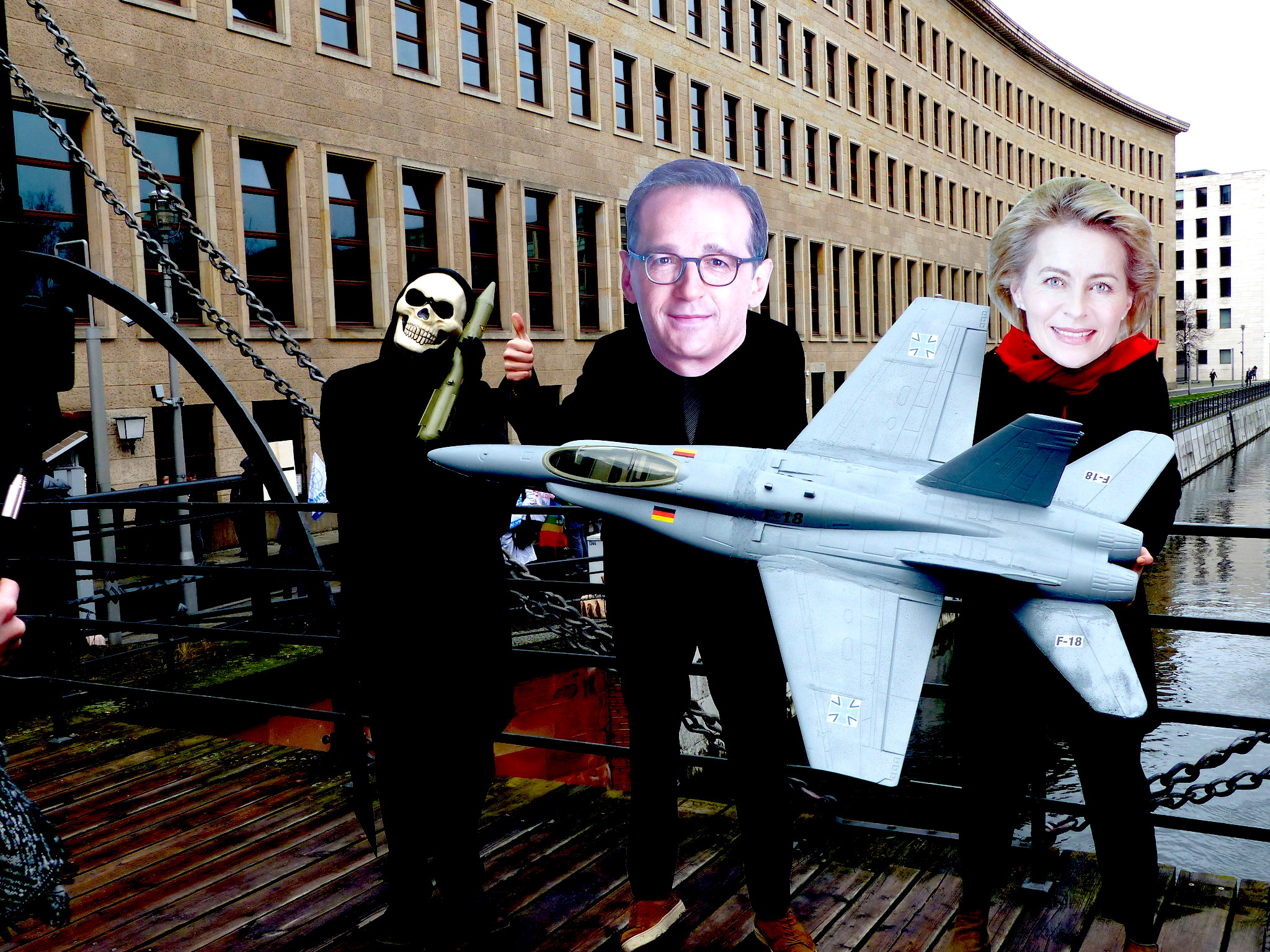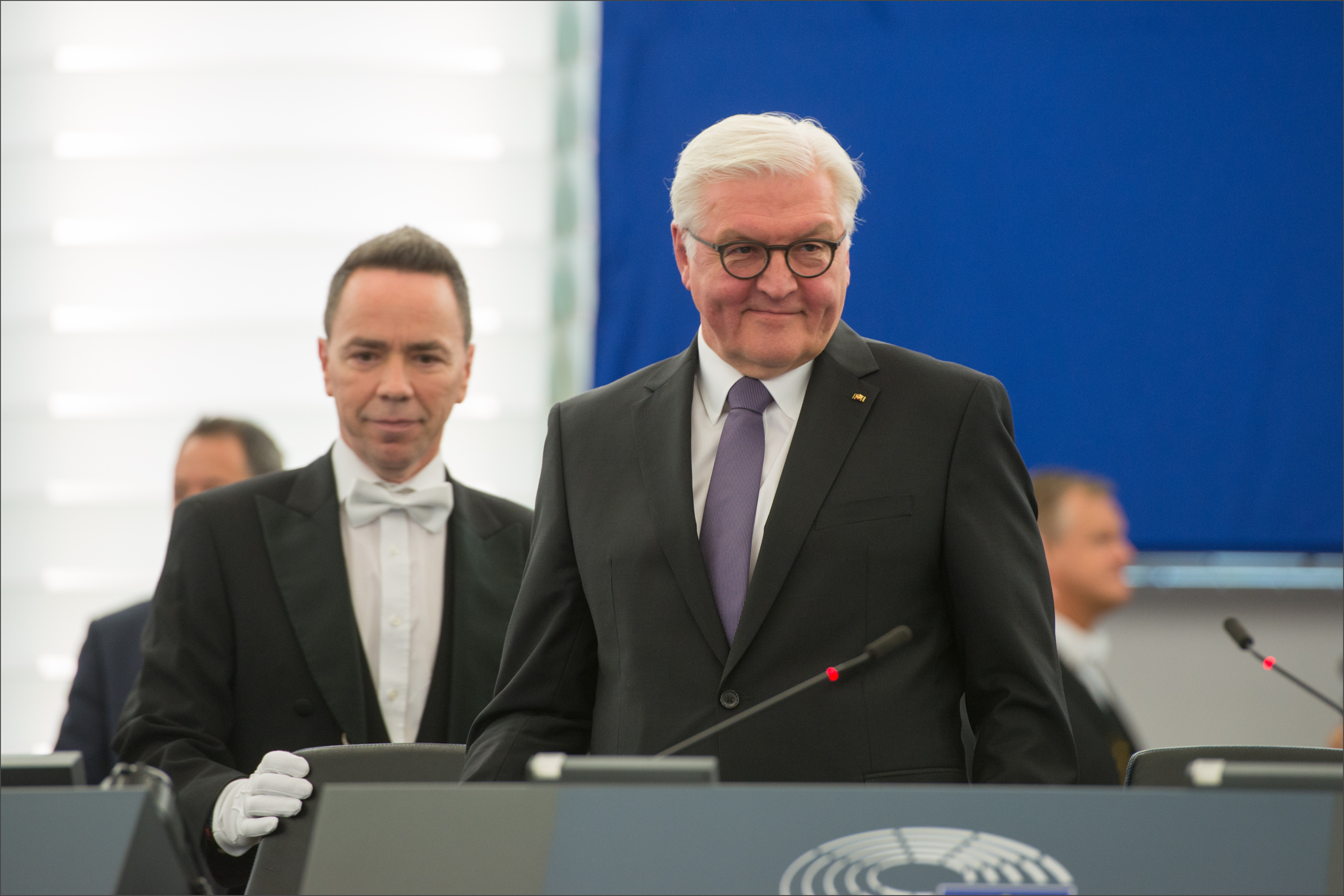Proposing that foreign policy be subjected to democratic processes is a call, essentially, to revolution.

March 15, 2019: Peace activists in Berlin discouraging Germany from buying combat aircraft that can be used as delivery systems for nuclear weapons. (Ippnw Deutschland, Flickr, CC BY-NC-SA 2.0)
By Patrick Lawrence
Special to Consortium News
 I had a letter in the mail the other week from someone named Barry Klein, who resides in Houston. I filed it knowing I would write about it, and now I shall.
I had a letter in the mail the other week from someone named Barry Klein, who resides in Houston. I filed it knowing I would write about it, and now I shall.
Klein runs a group called ForeignPolicyAlliance.org. “Wars without end?” read the accordion brochure Klein sent. “Americans on the left and right are uniting to ask, Why? A call to reform U.S. foreign policy.”
This guy has endorsements that glow in the dark. Dan Ellsberg, Andy Bacevich, Sharon Tennison, Gordon Adams, Larry Wilkerson and Peter Kuznick: These are big names in the alternative foreign policy business.
Klein included a one-sheet flier with the Foreign Policy Alliance prospectus. “How to immediately spur a movement to stop the proxy war in Ukraine,” is the headline. Good enough, but what stopped me cold was a Post–It note Klein stuck in the right-hand corner. “A strategy to make foreign policy a local issue,” he scribbled.
Klein is onto a question that has preoccupied me for years. This is about the sequestration of foreign policy cliques. They aren’t as utterly immune from political oversight as the C.I.A., but they are sheltered cliques nonetheless. Ever watch the U.S. Senate Foreign Relations Committee question someone from the State Department or the White House? It’s pro forma start-to-finish. It seems rubber stamps are issued to each senator on the panel.
In a related development (I miss the old newspaper clichés), I had an email last week from Fritzi Cohen, the energetic founder of the Tabard Inn in Washington. Fritzi is a driving force behind a thoughtful group called the Chaucerian Foundation, which is dedicated to policy questions rather than 14th century English poetry.
Fritzi has made the Tabard a wonderful meeting place for paying-attention people of all sorts, just what Washington needs. Last Saturday she hosted a gathering in the Tabard’s bar — where an excellent Negroni is to be had, I should mention —on the topic, “Biological Warfare in the 21st Century? Addressing Pentagon-funded Biolabs Around the World.”
It is another urgent question, given revelations this spring of 30–odd biolabs in Ukraine. If I had to name one group of corrupt ideologues who should not be allowed anywhere near biolabs, it would be the Nazi-inspired regime in Kiev.

Tabard Inn, Washington, D.C., September 2021. (Kurt Kaiser, CC0, Wikimedia Commons)
I was unable to attend the event at the Tabard, but the video can be viewed here. As with Barry Klein’s Foreign Policy Alliance, Fritzi Cohen’s event brings foreign policy into the purview of the American citizenry.
The speakers and organizers were of a variety of stripes, from the left (Garland Nixon, Sam Husseini) to Mollie Hemingway, who edits The Federalist.
“Tell me, what exactly is ‘an authentically progressive foreign policy?’” So a reader asked in the comment thread at the end of a column I published elsewhere many years ago.
A year earlier, the U.S. had cultivated the coup in Ukraine and it was coming to light then that Washington was backing ISIS and other blood-soaked jihadists in its dirty war in Syria.
It was a good question, given the mess foreign policy had become in America’s late-imperial phase, which I date to the attacks of Sept. 11.
Any honorable foreign policy dedicated to the betterment of the human condition, I responded in a column, must begin by wresting control of the policy making from inception to execution away from the elites who now control it. This is a 21st century imperative Americans must address to alter the country’s direction.
Something else happened around that time in 2015.
Frank–Walter Steinmeier
Frank–Walter Steinmeier, now the German president, was then the Social Democratic foreign minister at that time. Today he is routinely subject to the abuses of Ukrainian officials simply because he insists that diplomatic channels between Moscow and Western capitals remain open.
Shame on Steinmeier. Curse him. A negotiated settlement to the Ukraine crisis that recognizes the interests of all sides: Nein, Herr Steinmeier. Niemals.
Steinmeier ran an extraordinary project during his years as FM, 2013 to 2017. As soon as he took office, he authorized a study to determine how Germany could renovate foreign policy and the policy-setting process in response to a drastically changing global environment.

German President Frank-Walter Steinmeier, right, addressing European Parliament in 2017. (European Parliament, Flickr, CC BY-NC-ND 2.0)
The broader objectives of “Review 2014—Foreign Policy Thinking Ahead,” as the ministry titled its working draft, was to establish core principles for the Federal Republic to conduct relations with the rest of the world.
In brief, Steinmeier and his people argued that German foreign policy in the 21st century must rest on international law and that it should derive from a holistic community of thinkers, not merely the policy cliques in Berlin.
Steinmeier’s ministry proposed no less than the democratization of German foreign policy. I doubt it was lost on anyone at the time that this was an implicit challenge to the overweening, overstepping policy cliques in Washington. “It is almost certainly intended to be so,” I wrote then, “although those courteous Germans would never say as much.”
Three Core Challenges
Steinmeier’s people identified three core challenges in the years ahead: 1.) crisis prevention, crisis management and post-crisis stabilization; 2.) maintenance of a world order worthy of the designation, and 3.) recognitions of a European context in which Germany would fashion its policy.
Can anyone imagine an American political or diplomatic figure making these surmises and proposing this map into the future?:
- Steinmeier saw crisis as the norm for two decades out from the time of his project. The ministry was to create an independent department to anticipate crises, address them when they erupt and help advance beyond them afterward. The key was gathering all resources in one room. “We want to learn from the experience of our crisis response center,” Steinmeier explained when the ministry’s work was done. Political solutions are to be paramount, and not merely in word.
- Steinmeier’s ministry saw the future in stricter adherence to international law and regulation. On the bureaucratic side, this meant merging the ministry’s disarmament and U.N. departments — which would be much more than a rearrangement of the Federal Foreign Office’s furniture. “We thus create a place where the principle for international order that is closest to our hearts —multilateralism — fully applies,” as the FM explained it.
- There was for Steinmeier the touchy question of Europe and Germany’s place in it. Berlin must look beyond Germany from now on and embed its policy in the European context, the report argued. Translation: We will speak for Europe now and will act accordingly. Intent: “To give Europe more influence in world affairs,” in Steinmeier’s words.
I read this last part as an argument that Germany must move beyond the boundaries imposed by its past and as a declaration that Europe must turn its own preferences into policies: a call for a more independent Europe, in other words. The U.S. had just engineered the fateful coup in Ukraine and begun imposing sanctions on Russia that were not going to serve Europe well.
The truly innovative features of Steinmeier’s project concerned how foreign policies were to be developed and who would have a say in what was finally executed. Policy was to derive not from wonks and technocrats with narrow fields of vision, but from a holistic community of thinkers: Political experts, economists, urban planners, sociologists, historians, educators, aid people, military people, foreign advisers and so on would gather with the policy people to shape the strategy.
Out of this, something like an 11th commandment would emerge: Military force would be re-rated as a last resort.
Most interesting to me are Steinmeier’s provisions for public participation in policy planning. This would be by way of an elaborate provision for town meetings, referenda, opinion surveys and other administrative mechanisms — all with the intent to make foreign policy authentically an expression of the German citizenry’s aspirations — who they wanted to be, how they wanted the community called the Federal Republic of Germany to conduct itself in their names.
The Foreign Ministry’s final report, “Crisis—Order—Europe,” was named for the above-noted questions it sought to answer and was published in March 2015. Steinmeier was forceful when he presented it in the Bundestag the previous month.
“Foreign policy is about more than just two extremes: either just talking or shooting, either futile diplomacy or Bundeswehr deployments abroad,” the FM said as he introduced his ministry’s conclusions. “The world has changed, and the Federal Foreign Office must change with it.”

Germany’s Federal Foreign Office in Berlin. (Manfred Brückels, CC BY-SA 2.0, Wikimedia Commons)
Much has transpired since then. Germany is learning to assert itself in a healthier manner, but the occasion for this is the West’s misguided determination to arm an objectionable regime in a proxy war against Russia. It is actively in search of a new foreign policy but it appears to be groping blindly for it, as Sylvie Kauffmann, Le Monde columnist, put it in the FT the other day.
These are not, surely, the outcomes Frank–Walter Steinmeier had in mind. And there is little sign that authority over German foreign policy has devolved to German citizens or that that a holistic community of thinkers recruited to formulate policy has coalesced to any meaningful extent.
There’s a long tradition in the West wherein foreign policy is the preserve of an elite not answerable to an electorate. This has been the case in the U.S. since it had a foreign policy to speak of in the late 19th century.
To propose subjecting policy to democratic processes by way of continuing national dialogue is thus a call to revolution of a sort. As Steinmeier and his ministry concluded, the globalization process makes policy everyone’s business now.
[The columns I wrote on Steinimeier’s project are here and here. The Foreign Ministry’s report, in English, is here. An essay Steinmeier published in Project Syndicate on February 25, the date of his presentation in the Bundestag, is here.]
I cannot think of even a minor aspect of “Crisis—Order—Europe” that policy cliques in Washington are even remotely considering. But a key questions of our time — the control of foreign policy — now has substance and a framework to break with tradition.
It’s impossible to predict how long it would take. The last American effort was during the Vietnam war after the antiwar movement asserted popular will.
But too much has changed since then in public attitudes, atomization and privatization of consciousness. Such a transformation would require a media with integrity, balance and distance from power. The mainstream press as we have it has none of these.
This is about a system, not just the latest war. The process is set in motion. In Steinmeier’s case it was from the top down. In the cases of Klein, Cohen and other Americans making the same effort, it is bottom up.
When a fundamental shift in the policy process is achieved it will belong to those who insisted on it. Barry Klein, Fritzi Cohen and those who stand with them are taking an important step. I commend them.
Patrick Lawrence, a correspondent abroad for many years, chiefly for the International Herald Tribune, is a columnist, essayist, author and lecturer. His most recent book is Time No Longer: Americans After the American Century. Follow him on Twitter @thefloutist. His web site is Patrick Lawrence. Support his work via his Patreon site.
The views expressed are solely those of the author and may or may not reflect those of Consortium News.

2 related matters to inject into the conversation;
”A 101-year-old man was convicted of more than 3500 counts of accessory to murder for serving at a Nazi concentration camp in WW!!’
Smell like smoke? hxxps://sonar21.com/back-to-the-future-in-ukraine-demilitarization-and-denazification/
‘For a more than 20 years after World War II, nearly 100 former members of Adolf Hitler’s Nazi party held high-ranking positions in the West German Justice Ministry, according to a German government report.
From 1949 to 1973, 90 of the 170 leading lawyers and judges in the then-West German Justice Ministry had been members of the Nazi Party….
[D]uring the Potsdam Conference, on 30 July 1945, the Allied Control Council was constituted in Berlin to execute the Allied resolutions (the “Four Ds“):[11][12]
Denazification of the German society to eradicate Nazi influence
Demilitarization of the former Wehrmacht forces and the German arms industry; however, the circumstances of the Cold War soon led to Germany’s Wiederbewaffnung including the re-establishment of both the Bundeswehr and the National People’s Army
Democratization, including the formation of political parties and trade unions, freedom of speech, of the press and religion
Decentralization resulting in German federalism, along with disassemblement as part of the industrial plans for Germany. Dismantling was stopped in West Germany in 1951 according to the Truman Doctrine, whereafter East Germany had to cope with the impact alone.
Putin’s reiteration of the Denazification and Demilitarization principles established from the 1945 Potsdam Conference is not just some quaint tip of the hat to history. He was laying down a marker to the United States and United Kingdom that the agreement reached at Potsdam in 1945 is still relevant and valid….’
Regarding: “There’s a long tradition in the West wherein foreign policy is the preserve of an elite not answerable to an electorate. This has been the case in the U.S. since it had a foreign policy to speak of in the late 19th century.”
This reflects the words of Sheldon Wolin (“Democracy Incorporated”):
“Throughout American history political leaders, opinion makers, and academics have maintained that foreign policy should be out-of-bounds politically, not only to safeguard secrets but to insulate decision-makers from the whims of a democratic citizenry and the distractions of populist politics. Prestigious academics have warned that if foreign policy decisions were made sensitive to public opinion, the result would likely be either indecision or constant ‘shifting’ in response to a whimsical populace …”
This self-serving elitist dogma warrants examination as identified by Prof. William Robinson
“We must start by understanding that US foreign policy is not, and has never been, about promoting and supporting democracy and human rights. It is about defending an unjust and fundamentally undemocratic international order; concretely, at this time, about advancing the agenda of the transnational elite and defending global capitalism.” hxxp://www.truth-out.org/opinion/item/25141-prof-william-i-robinson-global-capitalism-is-in-the-midst-of-its-most-severe-crisis
With this in mind, one can quickly understand why the elites have chosen seemingly insane actions on foreign policy creating blowback (both of the Christopher Simpson and Chalmers Johnson kind), endless wars (Vietnam, Iraq, Afghanistan, Libya, Syria, Yemen), fomenting civil wars (Ukraine, Yugoslavia, Rwanda, Congo, Horn of Africa, Indonesia, …), CIA coups (nearly every country in Central/South America and numerous African, Asian and European countries), and promoting assassinations and torture. I guess this is to be expected from a country founded on piracy, slavery and genocide.
But now the threat posed by this elite-determined foreign policy not only threatens a nuclear confrontation over Ukraine, but is a policy specifically designed to exacerbate climate change which threatens humanity as a whole.
“While most of the European public wants to prevent global warming and prevent carbon into the atmosphere, U.S. foreign policy is based on increasing, and even accelerating, global warming, accelerating carbon emissions because that’s the oil trade. … if they were completely self-sufficient in energy without oil or gas or coal, America would lose the primary lever. It has over the ability to turn off the power and electricity and oil of any country that didn’t follow U.S. diplomatic direction.” Michael Hudson hxxps://www.counterpunch.org/2022/03/25/the-blowback-from-sanctions-on-russia/
Democratizing foreign policy may be the only way to prevent our own extinction.
Steinmeyer’s ideas are interesting but in ultra capitalist Germany, I fear that the decisions are more likely to be formulated by Siemens, Mercedes, Deutsche Bank etc., and they will never surrender that privilege. Of course, the message of this piece is spot on: Germany must lead Europe. And Germany must work towards a special relationship with Russia. France won’t like that and Britain will scream so here we go again.
I won’t argue with you wrt Britain, but wrt France, if I’m not mistaken de Gaulle also wanted a Europe independent of the USA and Britain, so what would France not like about this, aside from losing its role as prospective leader?
Switzerland has a system that seems to work too: through refendum, it is the public who decides what line central government in Bern is to follow. In most cases the government abides by the public’s opinion. I would say that this is as close as a country can get to democracy: popular vote.
to make an example, if Switzerland wants to join the EU or NATO, the concerning law must pass a compulsory referendum, a majority of both citizens and cantons is needed.
If so, why is Switzerland allowing Zelensky’s Zionist handler, Kolomoisky, and a swag of crooked Ukie pollies to buy up prime Swiss property, some of which don’t even appear on Google maps?
Kudos for the FINE article, recognizing and articulating something calling for our efforts. Welcome aboard. Hope this becomes a recurring thread on the wide audience you have.
I live in Taos County, about 60 miles from Los Alamos National Labs, tasked with working around the clock to making a key component of various hydrogen bombs, essentially the Trinity prototype/Nagasaki type plutonium as critical mass type, now the trigger/detonator for the “modern bomb. What makes foreign policy at the local level difficult, is the success TPTB has had with implementing a project of the scale of the Manhattan project, WITHOUT the process even going through the facade of a public hearing, having open majority support of the (s)elected “officials”. ONE man, FDR was able to start a payment stream from which recipients received U.S. dollars. The public was rather COMPLETELY shut out of the process. Not only was the public( inc. soon to be POTUS VP H. Truman.) shut out, but the scientists during the making, and the public thereafter, were SERIOUSLY misled as to WHY the bomb was built, although Director. Gen. Groves testified during the hearing to strip Oppenheimer of his security clearance, that he understood “ within two weeks of becoming director, that the bomb was being built against Russia, and I conduction the operation as such. “is printed in the Congressional Record.
So here (in Northern New Mexico, we work to educate people on how the ability to conduct foreign policy (here in the current US that is “politics through the barrel of the gun.” is actually conducted, The goal of TPTB was (now the “slide down the hill” ) to use technology to give as few as possible the power to decide where and when to destroy on a MASSIVE scale. The hydrogen bomb was seen as the ideal “enforcer” of political will. As Daniel Ellsberg has stated/written, the movie “Dr. Strangelove” should be viewed as a documentary, not as fiction.
More at hxxp://www.lasg.org/ [ Los Alamos Study Group, Greg Mello, director.
Caitlin Johnstone writes : “ Speaking of the U.S. empire’s world-threatening proxy war with Russia, I would like to highlight an important new dialogue between The Socialist Program’s Brian Becker and a scientist named Greg Mello, who is the co-founder and executive director of the Los Alamos Study Group and an expert on nuclear war. The interview is just as valuable for Becker’s insightful commentary as Mello’s. Together they provide a lot of sorely needed insight into the nature of the horrifying games the empire is playing with our lives in this nuclear standoff.”
hxxps://consortiumnews.com/2022/05/06/caitlin-johnstone-empire-news-roundup/
Best erich
I must say that is a brilliant idea. Consortium News is new found place for me and it’s such a goldmine for credible information. Guess what I am going to read on my summer holiday…
As I said, I admire Herr Steinmeier’s ideas and approach and I wish him luck. In the US, any such effort would require a wholesale change in the electoral process. Most of our “elites” are basically failed politicians or former government apparatchiks waiting to get back in government when their flavor of ideology regains control in DC.
BTW, as far as I can tell, the only thing the peace movement of Vietnam did was get the military to cancel (sorta) the draft. Even Frank Church’s changes to control the CIA were run around.
Reminiscent of Kucinich and his ‘Department of Peace’ platform which was frantically squashed by Democrat Party functionaries before it could make it into the party platform where it would likely have died anyway.
“To propose subjecting policy to democratic processes by way of continuing national dialogue is thus a call to revolution of a sort. As Steinmeier and his ministry concluded, the globalization process makes policy everyone’s business now. ”
“ ‘Foreign policy is about more than just two extremes: either just talking or shooting, either futile diplomacy or Bundeswehr deployments abroad,’ the FM said as he introduced his ministry’s conclusions.”
It would be a profound shift of the paradigm for Germany to be the leader in global cooperation.